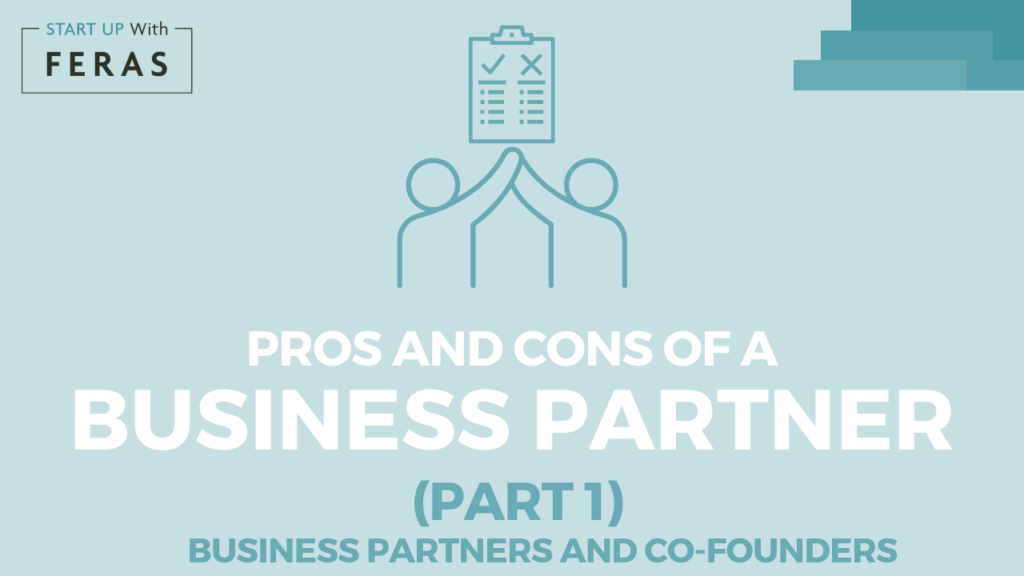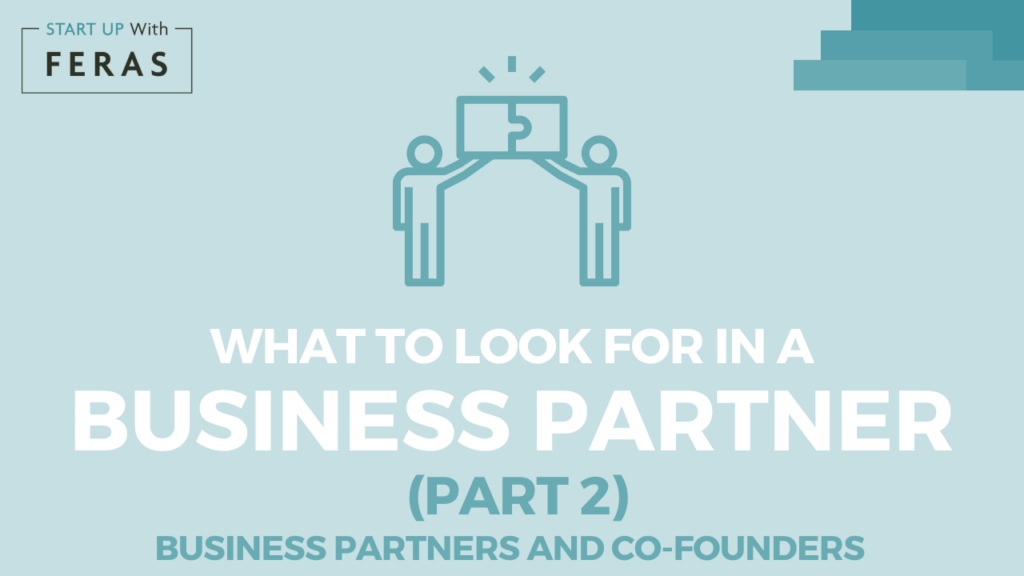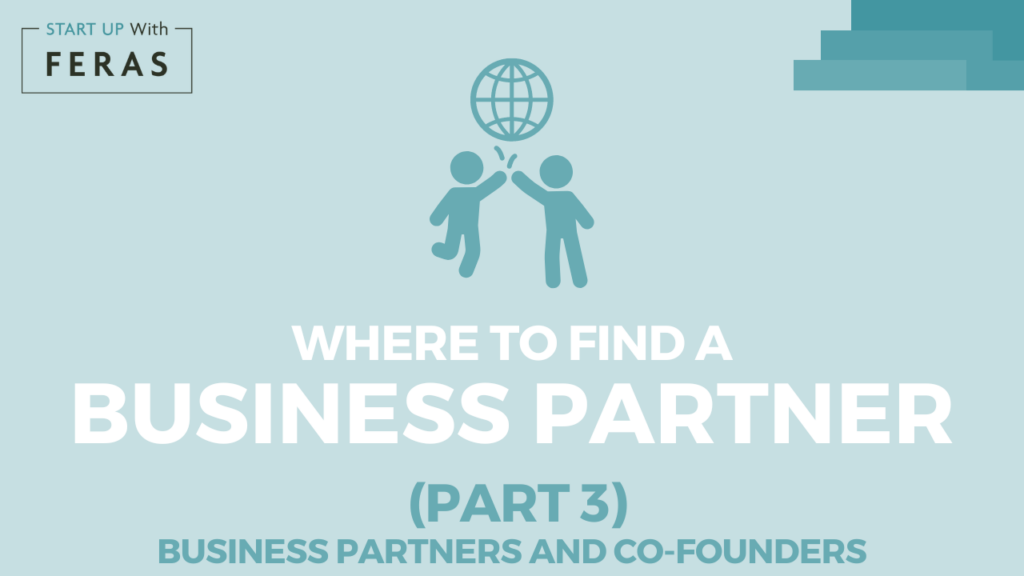Where and How to Find a Business Partner For Your Startup (and Avoiding the Wrong Ones)

What’s the one thing Steve Jobs, Bill Gates, and Larry Page had in common besides genius? They all had business partners. Think of it this way: starting a business alone is like building a house with one hand. It’s tough! But having a partner is like suddenly having two hands – you can build faster, stronger, and get more creative.
But it’s not just about how to find a business partner for your startup; it’s about finding the one that is the right match for your needs and your goals.
The truth is, choosing the right business partner can make or break your company. Finding that perfect fit isn’t a walk in the park, especially when friends and family want in.
How do you find someone who’s perfect for you and your business? And what if your best friend or family member is vying for the role? Let’s start by understanding what a business partner is.
Watch the video where I cover this topic in depth:
What is a Business Partner?
In its simplest form, they’re someone you team up with to run a company or your startup. They share in the ownership, profits, and losses of the business. But it goes deeper than that. A true business partnership is a shared journey. You’ll brainstorm innovative ideas, strategize for growth, and resolve challenges together. You’ll celebrate each milestone, big or small, knowing you achieved it as a team.
And while every partnership is unique, there are a few common types to consider:
Active Partners
These partners are involved in the day-to-day operations of the business and share equal responsibility for its debts and liabilities.
Silent or Equity Partners
These partners invest money but usually have even less involvement in the company.
Understanding the different types of partnerships is crucial, but it’s equally important to weigh the advantages and disadvantages before taking the plunge.
Joint Venture Partners
These partners collaborate on a specific project or a venture that may have a more limited scope than a broad or long-term business vision.
Pro Tip: Speak with An Attorney
In almost all cases, it’s recommended that you confer with a legal professional to assist with your partnership agreement. Seek an attorney who is experienced in partnerships. Familiarity with your industry vertical is a plus.
Pros and Cons of Having a Partner in Business
Pros:
- Shared Workload: Two heads (or more) are better than one! Partners can split responsibilities, allowing each person to focus on their strengths.
- Increased Resources: Partners can pool their money, skills, and connections to give the business a better chance of success.
- Emotional Support: Running a business can be lonely. A partner can offer support and encouragement during tough times.
Cons:
- Potential for Conflict: Disagreements are inevitable. If not managed well, they can damage the business and the relationship.
- Shared Profits: You’ll have to split the profits, even if you feel you did more of the work.
- Loss of Control: You won’t have complete control over decisions. You’ll need to learn to compromise and collaborate.
My Experience with Partnerships
In all of my 7 ventures, I’ve always had business partners and co-founders, it has worked out really well for me and it’s something I recommend. But like any relationship, a business partnership has its ups and downs. However, studies suggest that businesses with partners often fare better than those run by just one person.
How to Find a Partner in Business & Where to Look
Now that you understand what a business partner is and the potential benefits and drawbacks, it’s time to find the right one. But where do you look?
Sam Altman once said, “Choosing a random co-founder or choosing someone you don’t have a long history with for your startup usually ends in a disaster.”
Sam Altman’s quote is a great reminder that choosing a potential business partner either for a small business or otherwise is a significant decision, similar in some ways to choosing a life partner.
Think about it: you wouldn’t just get married to the first person you met at the bus stop, right?
It’s the same with looking for a business partner. Just because someone seems interesting, has some money to invest, or has a cool business idea doesn’t mean they’re the right fit for a lifelong (or at least long-term) commitment.
To get started, start your search from:
Your Existing Network
- Colleagues
- Current colleagues: People you currently work with may share your entrepreneurial spirit and have complementary skills.
- Ex-colleagues: Former co-workers can be a great resource, as you already have a sense of their work ethic and abilities.
- Vendors/Suppliers
- Business relationships: If you have strong relationships with vendors or suppliers, consider exploring potential partnerships. They may have a vested interest in your success and bring valuable industry insights.
- Friends
- College friends: Friends from your college days might be on a similar career trajectory and share your ambition.
- Friends from community organizations or hobbies: Shared interests and passions outside of work can be a solid foundation for a business partnership.
If you’ve exhausted your immediate network and are still on the hunt for the perfect business partner, not to worry! There are plenty of other fish in the sea, or rather, potential matches for you.
Online Platforms
Several online platforms are specifically designed to match entrepreneurs with potential partners. These platforms often have detailed profiles where you can list your skills, your experience, and what you’re looking for. Popular options include:
- LinkedIn: While primarily a professional networking site, LinkedIn can be a goldmine for finding potential partners. Join industry-specific groups and engage in conversations to find like-minded individuals.
- CoFoundersLab: This global network connects entrepreneurs and helps them find co-founders, advisors, and team members.
Proceed with Caution
Remember, just because you meet someone online doesn’t mean they’re your soulmate business partner. You want to make sure that you approach these platforms with the same caution you would any online dating site. Don’t jump into a partnership right away!
Vetting Your Potential Partner
Take the time to get to know your potential partner, ensuring they share similar business vision with you before making any potential business partnership. Here are some tips:
- Start with a small project: Collaborate on a small project or freelance gig to see how you work together and if your skills and personalities mesh.
- Establish rapport: Get to know them outside of work. Grab a coffee, have a virtual chat, or even attend a networking event together. Building a personal connection is key to a successful partnership.
- Check references: Talk to their past colleagues or clients to get a sense of their work ethic and reliability.
- Evaluate their skills and personality: Make sure their skills complement yours and that your personalities are compatible. You don’t want to end up with a business partner who drives you crazy.
Choosing a business partner is a big decision, so don’t rush into it. Take your time, do your research, and trust your gut. The right person is out there, and with a little patience and persistence, you’ll find them.
And remember, it’s a bit like dating: Sometimes you have to kiss a few frogs (or, in this case, work with a few incompatible partners) before you find your prince or princess charming (or, your ideal business partner).
But to get started with finding a business partner online, here are some things you’ll need to get done.
Choosing the Right Business Partner
This decision can make or break your business, so it’s important to be thoughtful and deliberate.
What to Look for in a Business Partner
The perfect business partner is like a missing puzzle piece – they complement your strengths and fill your gaps. Here are some key qualities to look for:
- Skills and experience: Look for someone who brings skills to the table that you lack. If you’re great at marketing but not so great at finance, with a financial background could be a perfect match.
- Shared values and vision: Make sure you and your potential partner agree on important aspects of your proposed business. For example, if you want to quickly grow the company and reinvest profits while they prefer a slower pace and taking profits as personal income, it could lead to conflict. Agreeing on long-term goals, work ethic, and how to handle profits is essential for a harmonious partnership.
- Complementary personalities: While opposites can attract, successful business partnerships often thrive on complementary strengths. If you’re an optimistic person, a pragmatic partner can ground your ideas. If you’re a strategic thinker, a tactical partner can execute your plans. The key is to find a partner whose working style and skills complement yours, creating a well-rounded team.
- Trustworthiness and integrity: This is non-negotiable. Your partner should be honest and reliable and have a strong moral compass.
- Financial stability: A partner with a solid financial background can bring much needed stability to the business.
What to Avoid in a Business Partner
Just as important as knowing what to look for is knowing what to avoid. Here are some red flags that should give you pause:
- Dishonesty or lack of transparency: If a potential partner is evasive or secretive, it’s a major warning sign.
- Unreliability and lack of commitment: A business partner who doesn’t pull their weight can derail your progress.
- Incompatible goals: If you and your potential partner have fundamentally different visions for the business, it’s unlikely to work out in the long run.
- History of conflict: Look for someone who can handle disagreements constructively, not someone who is prone to drama or conflict.
Should I Partner with Friends and Family?
Partnering with a friend or family member can be rewarding, but it also adds a layer of complexity. Here’s what to keep in mind:
- Set clear expectations: Define roles, responsibilities, and decision-making processes from the start.
- Keep it professional: Treat the business relationship like any other professional partnership. Avoid letting personal feelings cloud your judgment.
- Put everything into writing: A formal partnership agreement is crucial to protect both the business and your personal relationship.
- Prepare for conflict: Disagreements are inevitable. Have a plan for resolving them quickly and amicably.
Choosing the right business partner is like finding the missing ingredient that completes the recipe for your business success.
The Time I Hired My Son
Back when one of my new businesses couldn’t afford a bookkeeper, my son stepped in to help. He still lived at home and was pursuing a business degree with a focus on accounting – a perfect match, right?
While the collaboration was great initially, the boundaries between work and home soon dissolved. Any disagreements we had at home carried over to the workplace, creating more friction in return.
I was both his manager and his father. It was easy for me to give an employee the benefit of the doubt when working through challenges, but I knew what this employee was doing during his time off so I thought I couldn’t cut him any slack.
In short, I was being unfair in critiquing the shortcomings on his part, and my unfairness strained the relationship.
Pro Tip: Get an Agreement, Even with Friends and Family
If you’re considering partnering with a friend or family member, setting clear boundaries and expectations upfront is crucial. A well-drafted partnership agreement can help protect both the business and your personal relationship. I know this firsthand. In a recent venture, I partnered with a close friend, someone I’d known and worked alongside for over a decade.
We trusted each other implicitly. However, we both understood the importance of having a formal agreement in place. We enlisted the help of our mutual friend Jeff, an attorney, to draft a comprehensive operating and partnership agreement.
It ended up being 53 pages long, but it was absolutely worth it! It may seem excessive, but it’s the prudent thing to do to ensure everyone is on the same page and protect both the business and the friendship.
Don’t skip this step! A well-drafted partnership agreement can save you from headaches and heartaches down the road.
Establishing a Successful Partnership
Once you’ve found the ideal business partner, it’s time to lay the groundwork for a successful and sustainable collaboration. This involves understanding different partnership models, formalizing your agreement, and prioritizing open communication.
Business Partner Contract
A well-crafted contract is the cornerstone of a successful partnership. It acts as a roadmap, outlining each partner’s rights, responsibilities, and expectations. This legal document covers:
- Ownership structure: Clearly define each person’s ownership percentage and equity stake in the business.
- Roles and responsibilities: Outline each person’s specific duties and contributions to the business.
- Decision-making process: Establish a clear process for making important business decisions.
- Profit and loss distribution: Detail how profits and losses will be shared among partners.
- Dispute resolution: Include a plan for resolving conflicts that may arise between partners.
- Exit strategies: Define the terms and conditions for a partner to leave the business.
Having a comprehensive contract in place can prevent misunderstandings, protect your interests, and ensure a smooth partnership journey.
Communication and Conflict Resolution
Open and honest communication is a key factor of any successful partnership. Establish a culture of transparency from the beginning. Regular meetings, check-ins, and constructive feedback sessions can help build trust and prevent misunderstandings.
Navigating the Challenges of Partnerships
Even the strongest business partnerships can face rough waters. Unforeseen challenges, disagreements, and changing circumstances can put a strain on your collaboration. Let’s explore one common point of conflict.
My Business Partner is Making Decisions Without Me
Feeling sidelined in your own business? If your partner is making unilateral decisions, it’s time to address the power imbalance. First, try open communication. Express your concerns and feelings honestly, but avoid accusations or blame.
If communication fails, review your partnership agreement. It should outline decision-making procedures and may offer a resolution process for disputes. If necessary, consult with a legal professional to understand your options and protect your interests.
Your Next Steps
Your business partner could be just around the corner. Start your search today by exploring the resources and platforms mentioned in this guide. Attend networking events, connect with other entrepreneurs online, and don’t be afraid to put yourself out there.
Before you finalize your decision, take a moment to reflect on the key points we’ve covered:
- Understand the different types of business partners and their roles.
- Explore various avenues for finding potential partners, both online and offline.
- Prioritize the right qualities in a partner: skills, experience, values, and a complementary personality.
- Be aware of potential red flags and dealbreakers.
- Take extra precautions when considering a partnership with friends or family.
- Set clear expectations.
- Establish a solid legal foundation.
- Foster open communication.
Remember, finding the right business partner is an investment in your company’s future. With the right person by your side, you can turn your entrepreneurial dreams into a reality.




